How to Get Rid of Scars on Arms
How to Get Rid of Scars, According to Dermatologists
Anything from an injury to acne can leave behind a lifetime of scarring. Dermatologists share their top strategies on how to get rid of scars and have smoother skin.
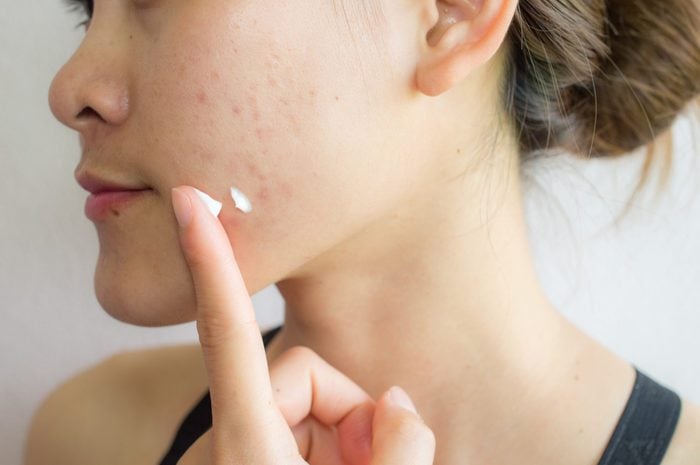 Boyloso/Shutterstock
Boyloso/Shutterstock
Take your vitamins
When it comes to patients looking for advice on how to get rid of scars left behind by acne, Deanne Mraz Robinson, MD, FAAD, of Modern Dermatology in Westport, Connecticut has an easy Rx. "Oral niacinamide is a B vitamin (B3) that has amazing anti-inflammatory and antibacterial qualities," she says. "It's not only helpful with treating active acne, but it's also a great treatment for the red scarring associated with healing acne lesions." Her recommended dosage is 500 mg twice per day for most patients—always speak with your doctor before beginning a supplement. She is also a fan of topical vitamin C, which she calls a powerhouse, "It can help combat hyperpigmented acne scars in addition to helping build new collagen and thus, smooth out acne scarring." For clearer skin, try these acne treatments dermatologists swear by.
 sruilk/Shutterstock
sruilk/Shutterstock
Fill it in
Acne scars are one of the most common issues Kenneth Howe, MD, sees at Wexler Dermatology. "You can tell how well a scar can be improved by stretching the skin around it with your fingers. The degree to which that changes the scar is how much it can improve," he says. He injects a hyaluronic acid filler, such as Juvederm or Restylane, to fill in deeper pockmarks during a quick in-office procedure.
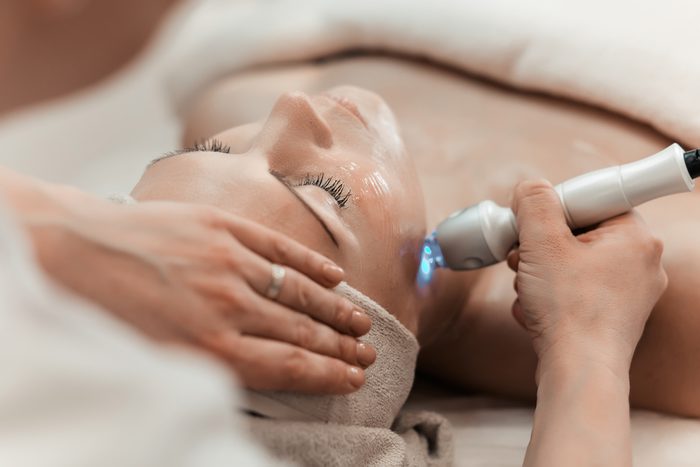 Stone36/Shutterstock
Stone36/Shutterstock
Laser your way to smoothness
Jeremy B. Green, MD, FAAD, of SKIN Associates of South Florida, knows how to get rid of scars using lasers. "Fractional lasers use tiny light beams to safely injure the skin with heat, stimulating your body's own healing responses, and thus building collagen and elastin to heal scars from the inside out," he says. That's one of the proven ways to treat even the most stubborn acne scars.
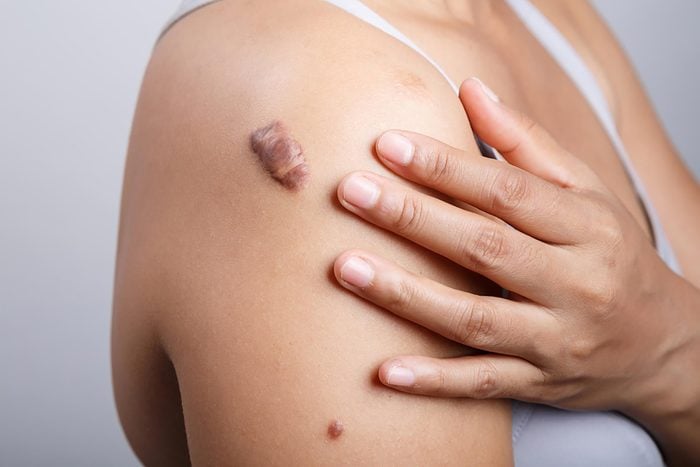 WEERACHAT/shutterstock
WEERACHAT/shutterstock
New hope for keloids
"Keloid scars have been historically hard to treat," says Dhaval Bhanusali, MD, a New York City-based dermatologist. But, thanks to ever-evolving technology, Dr. Bhanusali has found an effective answer to the question "how to get rid of scars?" "For raised burn scars and keloids, my favorite laser is Sciton's Pro Fractional Erbium laser," he says. However, the downtime for this type of treatment can be up to two weeks for tougher cases and, depending on where on your body the scar is, that can be a challenge. As an alternative, Jessica Mercer, MD, suggests an in-office corticosteroid injection, a synthetic steroid hormone that treats inflammation, to reduce the appearance of a keloid scar. Not sure if your scar is a keloid? Here are the telltale signs.
 LightField Studios/Shutterstock
LightField Studios/Shutterstock
Reach for the retinol
Regardless of the type or cause of the scar, treating the area with retinol or retinoid can help to even out your skin texture, says Jeremy Brauer, MD, clinical associate professor of dermatology at NYU. Over-the-counter topicals containing retinol will work, but consider asking your dermatologist for a prescription for a retinoid—here's the difference between retinol vs. retinoids explained. "Retinoids may help improve the appearance of scarring by stimulating collagen growth," says Dr. Brauer.
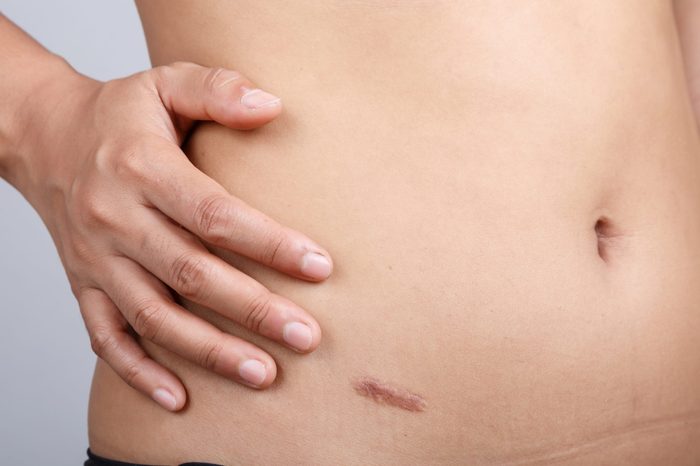 WEERACHAT/Shutterstock
WEERACHAT/Shutterstock
Help for pigmented scars
Scars come in all shades and textures, says Estee Williams, MD, and pigmented scars benefit from following a multi-faceted protocol. "For scars that have a brown color, a lightening cream such as La Roche-Posay Pigmentclar Serum, along with laser resurfacing at your dermatologist's can go a long way in fading the mark."
 Freeograph/Shutterstock
Freeograph/Shutterstock
Prevent scarring in the first place
Like with most things in life, an ounce of prevention is worth a pound of cure. When it comes to scars and the injuries that may cause them, that means you'll want to optimize the healing process by keeping wounds clean and moist to prevent infection, says Shari Marchbein, MD, a board-certified dermatologist who specializes in acne scarring. "Remember, scars are permanent and result from damage to the underlying collagen in the dermis," says Dr. Marchbein. In her office, patients get treated with Vaseline Original Healing Jelly after surgical procedures. She knows how to get rid of scars and opts for the ointment because it creates a protective barrier on the skin's surface, which speeds wound healing and improves scar appearance and prevents scabbing.
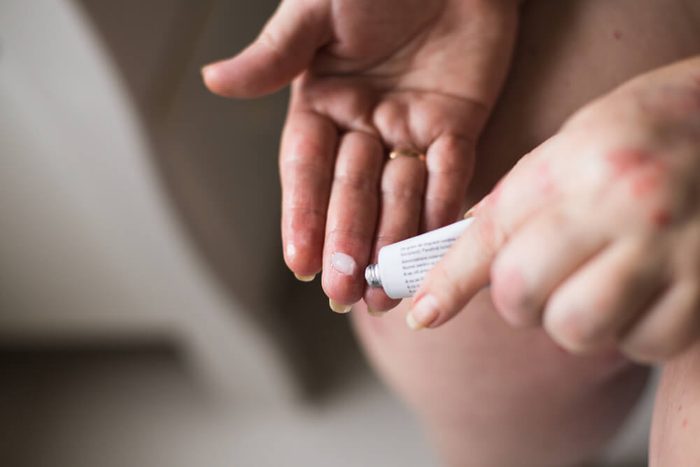 Ternavskaia Olga Alibec/Shutterstock
Ternavskaia Olga Alibec/Shutterstock
At-home therapy
For an at-home scar treatment, try a silicone-based gel, like Kelo-Cote, says Rita Linkner, MD, a board-certified dermatologist with Spring Street Dermatology. "Silicone acts like an adhesive and attracts the right type of cell in the skin, called a fibroblast, to stimulate new collagen growth," Dr. Linkner explains. Her suggestion is to apply the gel with a massage motion at night. Want to know if your ailment warrants a visit to your derma? These are the signs you need a skin doctor ASAP.
 Dean Drobot/Shutterstock
Dean Drobot/Shutterstock
Preventing further damage
Never, ever, leave the house without sunscreen, says Heidi Waldorf, MD, of Waldorf Dermatology Aesthetics. "Sunscreen is important to avoid discoloration but you don't need more sunscreen on the scar than the rest of your skin," she says. "The key is for nothing to change color in the sun." When looking to avoid scaring don't make these sunscreen mistakes.
Every product is independently selected by our editors. If you buy something through our links, we may earn an affiliate commission.
Originally Published: May 15, 2019
Sign up for articles sent right to your inbox
Enjoy the best stories, advice & jokes delivered right to your inbox!

Subscribe & SAVE Save Up To 84%!
How to Get Rid of Scars on Arms
Source: https://www.rd.com/list/how-to-get-rid-of-scars/